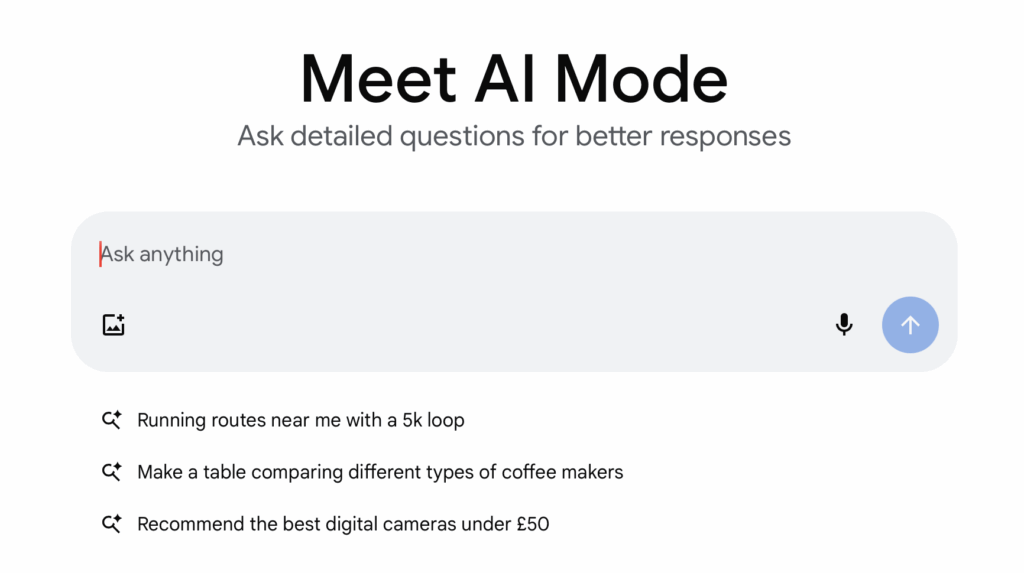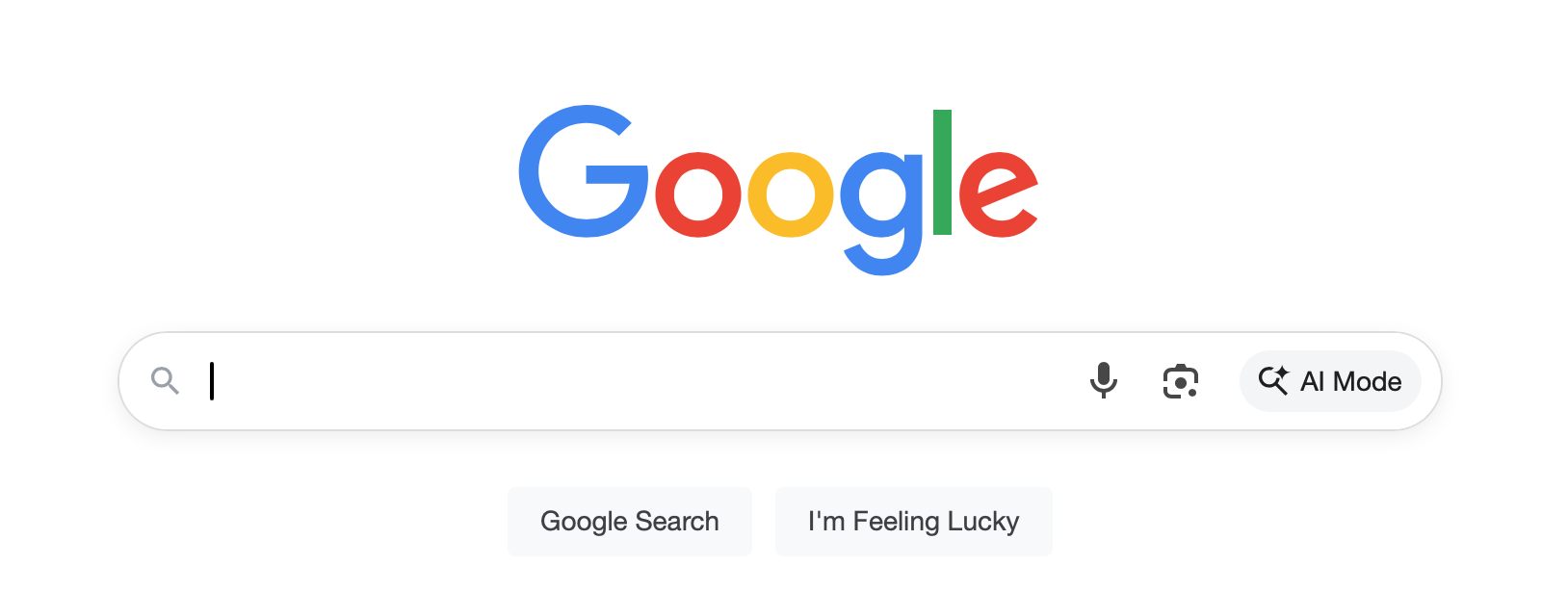Google has for many years been the most used search engine in the world. In March 2025, it represented 79.1% of the global online search engine market on desktop devices, processing billions of queries every day. And as a verb, it even gained a place in the Oxford English dictionary in 2006.
But with the increasing prevalence of AI, the search landscape is changing. Searchers are gradually beginning to turn to AI chatbots such as ChatGPT, which provide instant simple answers to questions. This removes the need for the searcher to trawl through lists of links as provided by traditional search engines.
Google has recently rolled out a new tool in the UK that gives searchers the option of viewing AI generated results written in a conversational style, and containing fewer links to other pages than its traditional search results.
In this article we take a look at Google AI Search, and answer some of the questions that may be on your mind.
What actually is Google AI Search?
Google AI Search is the incorporation of AI features into the Google Search engine. Known as Search Generative Experience – SGE – this can result in a more satisfying User Experience for searchers and help them to gain a quicker understanding of the topic of their search.
Google AI Search is able to process more complex queries than standard Google Search, include information from multiple sources in the answer, and handle follow up questions to dig deeper into the topic.
Is Google AI Search replacing traditional Google Search?
No. Google AI Search will co-exist alongside Google’s existing Search platform. It will be optional for searchers, appearing both as a menu tab and an option within the search box itself.
How do I use Google AI Search?
There are two ways to do this, depending how Google displays on your screen.
The first option is to click on the AI option within the search box itself, and you will be directed to the “Meet AI Mode” screen. You are encouraged to ask detailed questions for better responses. Type in a question to which you want an answer and send it. Google AI will respond “thinking” then provide you with a conversational answer to which you can ask supplementary questions if needed.

The second is to enter a search query as normal then click on AI mode, which should be the first tab – before All – beneath the search box. As above, Google AI will respond “thinking” then provide you with a conversational answer.

How does Google AI Search differ from AI Overview?
AI Overviews already often appear at the top of the search results page. The AI Overview provides a brief AI-generated summary of information to give you a quick answer to a search query.
If you scroll to the end of the AI Overview panel you will see the option to “Dive deeper in AI mode”. This will take you into Google AI Search.
The main difference with Google AI Search is that it offers a more interactive experience that is able to process more complex questions in a conversational mode.
What is Google Gemini?
Google Gemini has two different meanings.
The first is a large language model – LLM. LLMs are trained on very large amounts of data which enables them to understand and generate natural language and content. The largest and most capable LLMs are known as GPTs – Generative Pretrained Transformers. It is GPTs that have brought LLMs onto the public radar through their use in chatbots such as ChatGPT and Google Gemini.
Google AI Search is based on the Google Gemini LLM.
However, there is also a standalone chatbot called Google Gemini. Based on the Gemini LLM, it can understand and generate text, images, audio, video, and code. In this way, it functions as a personalised AI assistant, with capability of helping with a variety of tasks including writing, brainstorming, and learning. It can also integrate with Google apps such as Gmail, Google Drive, and Google Maps.
Google Gemini is now offered as an option on many Google apps, products and devices, and can also be accessed either through the Google Gemini website or via the Gemini mobile app for either Android or iPhone.
Which is best? AI Overview, AI Search or Gemini?
It really depends on your specific need at the time of searching. As a rough guide you should use:
- AI Overview – if you want a brief quick answer without too much accurate detail;
- AI Search – if your query is a bit more complex and you need the option of following up via a conversational interface;
- Gemini – if you want to combine a deeper level of research and conversation with other tasks such as writing, creating images or generating code.
How will Google AI search impact digital marketing?
As well as understanding the benefits of Google AI search from a user’s point of view, it’s important to consider the implications for digital marketing. We’ll look at this briefly now, and return in more depth in a future article.
Three of the areas most impacted by Google AI Search are SEO, content management, and paid search. Here are three potential implications for each of these areas:
SEO
- Fewer clicks through to your website due to relevant information being relayed through the Google AI search results. But the clicks you do get are likely to be higher quality.
- SEO keywords are becoming less important than topic authority. The more authoritative your content, the more likely you are to feature in Google AI Search results.
- More emphasis on E-E-A-T – Experience, Expertise, Authoritativeness, and Trustworthiness. Google’s AI models will prioritise content demonstrating high levels of E-E-A-T.
Content management
- Content needs to provide in-depth answers to the questions people are likely to ask. Searchers can get basic information from AI Overview Panels so you need to provide something more authoritative and authentic to gain their attention.
- Be aware that Google AI Search includes information from a range of formats, including video transcripts, image alt text, and infographics. All of these need to underpin and emphasise the consistency and quality of your content.
- Content should be written in natural conversational style so that it directly answers the natural language questions your target audience is likely to be asking.
Paid search
- Lower Click-Through Rates (CTR). Because AI Overviews can provide instant user information there may be less clicks on paid ads. It may be worth targeting high-intent users who have already done their research and are closer to a purchase decision, therefore more likely to click through.
- Poorer Ad visibility. The paid ads themselves may also be less visible due to the size of the AI Overview panel. However, Google is starting to integrate Search and Shopping ads directly into AI Overviews, which opens up new placement opportunities for advertisers.
- Increased Cost-Per-Click (CPC). With potentially less visibility in traditional placement of paid ads, and new opportunities in the AI Overview panel, there could be increased competition for the better slots, potentially driving up bidding costs. As with CTR, it could be worth focusing on high-intent keywords that are more likely to lead to conversions.
We hope that the above information answers some of your questions about Google AI and its potential impact on digital marketing, and will return to this rapidly evolving topic in a future article.
We hope to see you again here soon at Xcite Digital.
